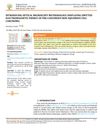56 citations,
September 2016 in “Pharmaceutical Research” The fish oil-based gel with imiquimod improves skin cancer treatment and reduces inflammation.
51 citations,
September 2008 in “Journal of Investigative Dermatology” Vitamin D receptor may help protect against UV-induced skin cancer.
 36 citations,
September 2009 in “Journal of Cellular and Molecular Medicine”
36 citations,
September 2009 in “Journal of Cellular and Molecular Medicine” New treatments targeting skin stem cells show promise for skin repair, anti-aging, and cancer therapy.
 20 citations,
August 2016 in “International Journal of Cancer”
20 citations,
August 2016 in “International Journal of Cancer” Men with male pattern baldness have a higher risk of certain skin cancers, especially on the scalp.
 16 citations,
October 2023 in “Molecular cancer”
16 citations,
October 2023 in “Molecular cancer” New treatments like nanotechnology show promise in improving skin cancer therapy.
 14 citations,
April 2019 in “PLOS ONE”
14 citations,
April 2019 in “PLOS ONE” Skin cancer is common in elderly nursing home residents, with risk factors including being male, having light skin, outdoor work history, and smoking. Regular skin checks are recommended.
 8 citations,
April 2022 in “BMC Geriatrics”
8 citations,
April 2022 in “BMC Geriatrics” Older men and those with a history of skin cancer have a higher risk of getting skin cancer again.
 7 citations,
August 2022 in “Experimental dermatology”
7 citations,
August 2022 in “Experimental dermatology” Blocking YAP/TAZ could be a new way to treat skin cancer.
 3 citations,
May 2021 in “British Journal of Dermatology”
3 citations,
May 2021 in “British Journal of Dermatology” The COVID-19 pandemic led to fewer skin checks and skin cancer diagnoses in Australia in 2020.
 2 citations,
March 2020 in “Cell”
2 citations,
March 2020 in “Cell” Elaine Fuchs' research shows how skin stem cells maintain health, aid in healing, and are involved in cancer.
 1 citations,
February 2015 in “Clinical and Experimental Dermatology”
1 citations,
February 2015 in “Clinical and Experimental Dermatology” A man got six skin cancers within a year after a cell transplant for leukemia but was cancer-free 32 months later; skin checks are important post-transplant.
 June 2023 in “British Journal of Dermatology”
June 2023 in “British Journal of Dermatology” High-quality data on skin cancer is crucial for understanding its trends and allocating healthcare resources effectively.
 May 2023 in “Dermatology Online Journal”
May 2023 in “Dermatology Online Journal” No increased skin cancer risk was found in alopecia patients treated with photobiomodulation.
 April 2018 in “Journal of Investigative Dermatology”
April 2018 in “Journal of Investigative Dermatology” BLZ-100 is safe for use in skin cancer surgery and may help identify cancerous tissue.
 July 2016 in “Cancer Research”
July 2016 in “Cancer Research” Male pattern baldness is linked to a higher risk of certain skin cancers, especially on the scalp.
 April 2016 in “Journal of Investigative Dermatology”
April 2016 in “Journal of Investigative Dermatology” Male pattern baldness is linked to a higher risk of certain skin cancers, especially on the scalp.
 May 2014 in “Journal of The American Academy of Dermatology”
May 2014 in “Journal of The American Academy of Dermatology” Patients with nonmelanoma skin cancers are most bothered by fear of progression, appearance concerns, and having cancer.
 April 2023 in “Journal of Investigative Dermatology”
April 2023 in “Journal of Investigative Dermatology” The research shows that skin cancer likely originates from hair follicles and that certain cell populations expand to promote skin cancer growth.
 November 2021 in “Research Square (Research Square)”
November 2021 in “Research Square (Research Square)” Older men and those with outdoor jobs are at higher risk for skin cancer; early full-body skin checks are recommended for early detection.
 211 citations,
May 2018 in “Trends in cell biology”
211 citations,
May 2018 in “Trends in cell biology” Different types of skin cells play specific roles in development, healing, and cancer.
1 citations,
November 2021 Non-invasive methods can effectively monitor skin inflammation and cancer biomarkers.
 86 citations,
October 2017 in “Clinics in Dermatology”
86 citations,
October 2017 in “Clinics in Dermatology” Older adults have a high rate of skin cancers like basal cell carcinoma and melanoma, mainly due to UV exposure and age.
78 citations,
January 2013 in “Brachytherapy” HDR electronic brachytherapy effectively treats nonmelanoma skin cancer with good cosmetic results and minimal side effects.
 12 citations,
January 2011 in “Dermatologic Surgery”
12 citations,
January 2011 in “Dermatologic Surgery” Retinoids can prevent skin cancer in high-risk people but have side effects and require more research on dosing and effectiveness.
 3 citations,
June 2021 in “Clinical, Cosmetic and Investigational Dermatology”
3 citations,
June 2021 in “Clinical, Cosmetic and Investigational Dermatology” Dermoscopy is an effective tool for accurately detecting skin cancers.
 1 citations,
January 2023 in “International Journal of Molecular Sciences”
1 citations,
January 2023 in “International Journal of Molecular Sciences” Understanding how Regulatory T Cells work could help create treatments for certain skin diseases and cancers.
1 citations,
October 2007 in “The Cancer Handbook” Malignant melanoma is the deadliest skin cancer, while BCC is the most common but rarely spreads, and SCC is more aggressive than BCC.
 February 2023 in “International journal of research - granthaalayah”
February 2023 in “International journal of research - granthaalayah” The new microscope method helps study energy from pre-cancerous skin cells.
 September 2018 in “Journal of Investigative Dermatology”
September 2018 in “Journal of Investigative Dermatology” Non-white organ transplant patients have worse skin cancer outcomes due to later diagnosis and treatment.
 April 2018 in “Journal of Investigative Dermatology”
April 2018 in “Journal of Investigative Dermatology” Nonmelanoma skin cancers have higher levels of certain osteopontin variants than normal skin.
























